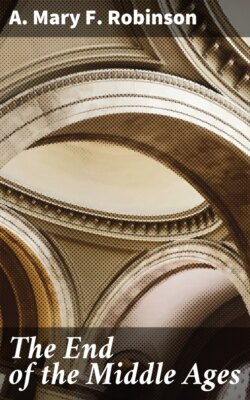Читать книгу The End of the Middle Ages - A. Mary F. Robinson - Страница 4
На сайте Литреса книга снята с продажи.
I.
ОглавлениеTable of Contents
With the approach of the thirteenth century, the world awoke from its long and dreamless sleep. Then began the age of faith, the miraculous century, starving for lack of bread and nourished upon heavenly roses. St. Louis and St. Elizabeth, Dominic the eloquent and the fiery Bonaventura, Thomas Aquinas and Francis the glorioso poverello di Dio, proclaim the enthusiastic spirit of the age. It is an age of chivalry no less in religion than in love, an age whose somewhat strained and mystical conception of virtue is sweetened by a new strong impulse of human pity. The world begins to see; and the green growth of the earth, the birds of the air, the fishes of the sea, become clear and noticeable things in the eyes of the saints. The world awakes and feels. Jean de Matha and Félix de Valois, gentlemen of Meaux, visit the prisons of France, and redeem many hundred captives from Morocco. On all sides men begin to love the sick, the poor, the sinful; even to long for sickness and poverty, as if in themselves they were virtuous; even to wonder whether sin and evil may not be a holy means for mortifying spiritual pride. To rescue the captive, to feed the hungry, to nurse the leper, as unawares Elizabeth of Hungary tended Christ in her Thuringian city—this is the new ideal of mankind. And this age of feeling is no less an age of speculation, of metaphysical inquiry, of manifold heresies and schisms. No new Bernard stops with his earnest dogma the thousand theories which everywhere arise and spread.
The modern age has begun. The saints of the preceding years had been men of a more militant or monastic turn, dogmatic minds like Bernard of Clairvaux, Norbert, Thomas à Becket. The era of charity and speculative thought begins when the twelfth century is drawing near the close.
From the last year of the eleventh century until the Christians were finally driven out of Syria in 1291, there had been scarcely a break in the continual crusade. Throughout the twelfth century this enthusiasm of pity for the dead Redeemer left in the hands of infidels was maintained at fever heat. Later it was softened and widened by the new spirit of charity towards ailing and erring humankind. But during the first hundred years of the Holy War it absorbed all that was holiest and purest, most ardent and noblest in European manhood. All went to fall upon the fields of Palestine, or to return strangely altered after many years. France, England, Germany, and Flanders, each in her turn commanded the pious host; but just as these countries were glorious in the East were they barren and empty at home. Whole districts of corn land and pasture lapsed again into moss and marsh. Whole countrysides were thinned of their hale and active men. A vast distress and indigence spread over Europe. Those were hard years for desolate women. Their spinning and broidery could not buy them bread, and bitter was the effort to live until their bread-winners returned. Even when the armies came back from Palestine there were many who did not return: many had died of strange Asiatic pestilences, many had not survived the long journey; the bones of some were bleached on the desert sand, and others whitened in the sea. And some of them had gained the crown which every pious soul then strove and yearned to win. They had fallen, as Mechtild of Magdeburg wished to fall, their heart’s blood streaming under the feet of heathen. And when the thinned and feeble ranks of the survivors came to their own country, a very dreadful cry went up from all the destitute widows in Europe.
Cruel indeed was their condition. Some, truly, sought for rest and quiet in the cloister; but in those days the cloister was death to the world. The charitable orders of Francis and Dominic were as yet undreamed of. Only the great meditative orders offered absolute renunciation and absolute seclusion. Timid and clinging hearts could not so utterly forego their world; many busy energetic spirits felt no vocation for the dreamy quiet of the cloistered nun. And for these the world was hard. They must beg the bread which their labour could very seldom earn. One dreadful trade indeed, which the desires of men leave ever open to the despair of women, one trade found many followers. But there were pure and holy women, and venerable women, and dying women, who could not live in sin. And there might be seen in every market-place miserable and hungry petitioners, crying, “For God’s sake, give us bread; bread for the love of Christ!”
Swestrones Brod durch Got. Sisters of bread for the sake of God. The name often strikes us in later writing. The singular title has become familiar. For when we read of piteous uncloistered piety, and when we read of humble merit rebuking the sins of arrogant Churchmen, and in the account of strange mystical heresies, and in the lists of interdicts and burnings, we shall often meet in the monkish Latin of Germany and Flanders that outlandish phrase: we shall hear again of the Swestrones Brod durch Got.
